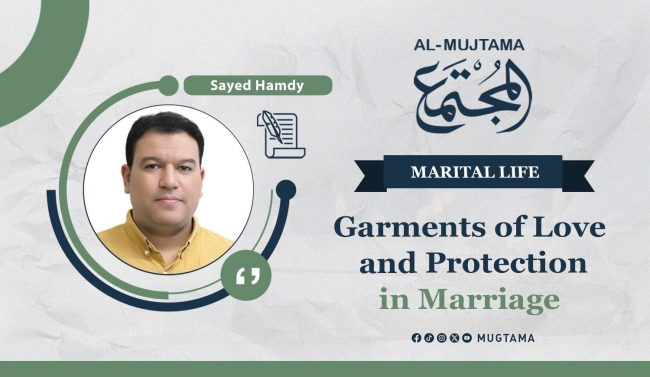“They are clothing for you and you are clothing for them.” (Al-Baqarah: 187); two sentences in the Book of Allah comprising just a few words that reflect the miraculous nature of the Quran, its high eloquence, and elevated rhetoric. These words convey many noble images and meanings and establish a comprehensive methodology for the desired marital relationship, which in turn produces a strong and righteous family that contributes to the righteousness and strength of society. Therefore, happy is the one who contemplates this eloquent ayah, acts upon its implications, and makes it a guiding light; for among the reasons for human happiness and marital bliss is adherence to the instructions in the Book of Allah and the guidance and directives of the Prophet (peace and blessings be upon him).
This Quranic ayah has been interpreted in various ways by scholars. They explained that clothing here means cover; meaning they are a cover for you, and you are a cover for them. This is because each spouse covers the other, prevents them from immorality, and satisfies them, making them needless of the forbidden. In Arab culture, family members are often referred to using terms like cover, clothing, garment, and wrap.
Among the interpretations is that they are a bed for you, and you are a blanket for them. Others said: they are a shelter for you, and you are a shelter for them, meaning you find tranquility in each other, as in Allah’s saying: “He created from it its mate, that he might dwell in security with her.” (Al-A'raf: 189), and His saying: “And of His signs is that He created for you from yourselves mates that you may find tranquility in them, and He placed between you affection and mercy.” (Ar-Rum: 21)
This noble ayah also employs the method of simile, where Allah likens the husband to clothing for his wife and the wife to clothing for her husband. By discussing the aspects of this simile, the greatness of the ayah becomes clear, as it addresses a sensitive issue in a beautiful, chaste, precise, and modest manner.
The primary function of clothing is to cover the body, and Allah has graciously provided humans with what covers their nakedness. He said, “O children of Adam, We have bestowed upon you clothing to conceal your private parts and as adornment. But the clothing of righteousness – that is best. That is from the signs of Allah that perhaps they will remember.” (Al-A'raf: 26) Fundamentally, each spouse should be a cover for the other, not exposing their faults or revealing their flaws, especially during conflicts. No sane person would expose their spouse's secrets, especially when they have been intimate. In a hadith, God's Messenger said: “Among those who will have the worst position in God’s sight on the day of resurrection is the man who has intercourse with his wife, and she with him, and then spreads her secret.” Similarly, no sane person would tear their clothes, especially in extreme cold; for in their clothes, they find the desired warmth. If they bought an expensive, beautiful, elegant garment that got damaged, they would seek to repair it rather than hastily discard it.
Just as clothing protects from heat and cold, the marital relationship is essentially relies upon protection and safeguarding; the husband protects his wife from immorality, and the wife protects her husband from immorality, in addition to providing physical and psychological protection.
Beauty is one of the most important characteristics of clothing, as humans are naturally inclined to choose clean and elegant garments because they reflect their true feelings. The Prophet (peace be upon him) said: “A person loves that his dress should be fine, and his shoes should be fine.”
One characteristic of clothing is that it should be the appropriate size. If a person wears tight clothes, they will not feel comfortable, and similarly, if they wear loose, baggy clothes. This signifies the importance of religious, social, and cultural compatibility between spouses. A husband should choose a wife who is “suitable” for him, and a woman's guardian should choose a husband who is “suitable” for her with great care, without haste; as there is a need for a minimum level of social adaptation, proximity of ideas, and ideally, close age, except in exceptional cases. Love, no matter how strong, may not be sufficient to overcome the issue of social, intellectual, and cultural differences between partners, as the gap arising from social, cultural, intellectual, and educational differences is difficult to bridge, especially in the contemporary world we live in. The right size for clothing ensures closeness, no matter how far apart the distances.
Apart from the need for the right size, there is also the need for adjustment; it is possible to alter the clothing to fit the person better. This may require giving up some excess parts to avoid looking misshapen. Similarly, in marital life, each partner comes with various qualities and traits, and to sustain and prolong marital life, each must relinquish some attributes and make some concessions to avoid distorting their lives together.
Clothing provides warmth and is responsible for balancing and adapting to the surrounding environment. The warmth a man finds with his wife cannot be found with anyone else, and the same applies to a woman with her husband, no matter how much affection her family has for her.
Undoubtedly, this noble ayah carries other meanings that highlight the marital relationship in its purest form, unharmed by anything. Every couple should contemplate the high meanings it contains so that each can provide the other with the shelter, protection, security, and psychological comfort that their role requires.
-------------------------------------------------------------


